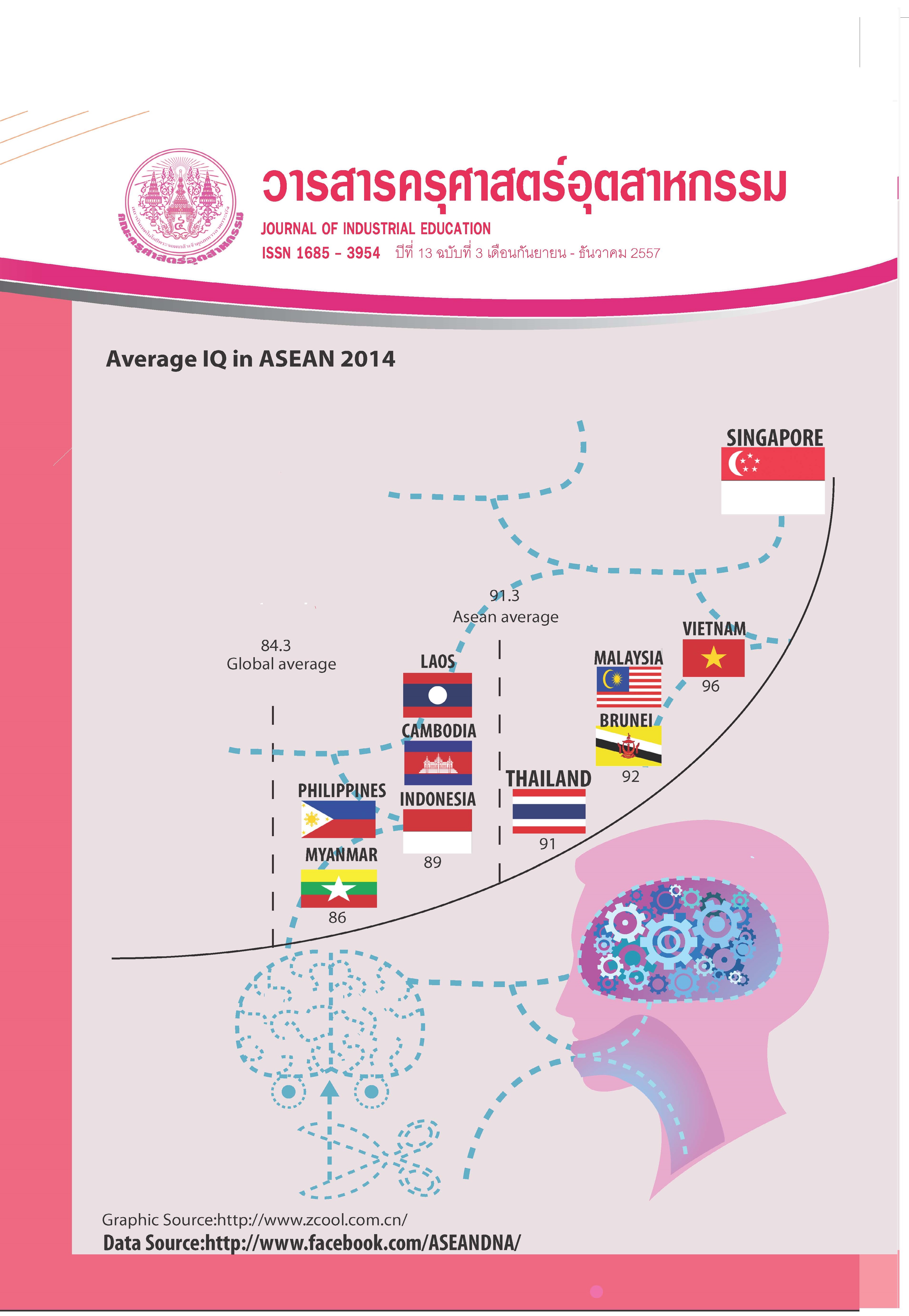Development of Casual Relationship Model on Important Factors Impacting Tax Auditors’ Professional Skills
Main Article Content
Abstract
This study aimed 1) to study causal relationship between ethics, excellence, and professional skills of tax auditor and 2) to propose causal relationship model of important factors affecting on tax auditor'sprofessional skills and verify important factors affecting on tax auditor's professional skills. The development model consisted of three latent variables and fourteen observed variables. The samples were 220 tax auditors who hold a license conducted by sample random sampling method. The research instruments were 5 rating scale. The validity was measured by five experts, and IOC value was greater than 0.50 in each question. Likewise, reliability calculated with Cronbach’s alpha was greater than 0.70. The collected data were analyzed with descriptive statistics and influence analysis through LISREL 8.80 Student Edition. The results showed that 1) ethics, excellence, and professional factors were statistically significant.2) a causal relationship model of important factors affecting on tax auditor's professional skills were consistent of the empirical data (Chi-square = 51.99 ; p-value = 0.11665 ; df = 41 ; CF = 0.998 ; RMSEA = 0.035). When considering casual relationship model on important factors which influenced on tax auditors’ professional skills, it demonstrated that it corresponded with collected data, and was suitably applied in constructing causal relationship model affecting on tax auditor's professional skills.
Article Details
"The opinions and contents including the words in papers are responsibility by the authors."
"ข้อคิดเห็น เนื้อหา รวมทั้งการใช้ภาษาในบทความถือเป็นความรับผิดชอบของผู้เขียน"
References
[2] กรมพัฒนาธุรกิจการค้า.2557.ข้อมูลการจดทะเบียนนิติบุคคล. [ออนไลน์].เข้าถึงได้จาก: https://www.dbd.go.th/ewt_news.php?nid =7193&filename=index(วันที่ค้นข้อมูล: 20 พฤษภาคม 2557).
[3] กรมสรรพากร. 2557.รายชื่อผู้สอบบัญชีภาษีอากร. [ออนไลน์]. เข้าถึงได้จาก:https://taxaudit.rd.go.th/ta2/TaxAuditor_Inf.jsp(วันที่ค้นข้อมูล 20 พฤษภาคม 2557).
[4] มหาวิทยาลัยสุโขทัยธรรมาธิราช. 2543. เอกสารการสอนชุดวิชาประสบการณ์วิชาชีพการบัญชี.นนทบุรี : มหาวิทยาลัยสุโขทัยธรรมาธิราช.
[5] ติน ปรัชญพฤทธิ์. 2546. การบริหารการพัฒนา.ความหมายเนื้อหาและปัญหา.กรุงเทพฯ: สำนักพิมพ์แห่งจุฬาลงกรณ์มหาวิทยาลัย.
[6] ศศิวิมล ศรีเจริญจิตร์. 2548. “Intention Education Standard (IES)”.สมาคมนักบัญชีและผู้สอบบัญชีรับอนุญาตแห่งประเทศไทย,5(3), น. 1-25.
[7] กรมสรรพากร. 2556. การบริหารทรัพยากรบุคคล.[ออนไลน์]. เข้าถึงได้จาก: https://www.rd.go.th/publish/7244.0.html(วันที่ค้นข้อมูล 15 ธันวาคม 2556).
[8] เสาวคนธ์ ศิรกิดากร. 2553.หลักการบริหารคนและองค์กรในโลกยุคคลื่นลูกที่4. กรุงเทพฯ:ทรู ดิจิตอล คอนเท้นท์ แอนด์ มีเดีย.
[9] สุวิมล ติรกานันท์. 2553. การวิเคราะห์ตัวแปรพหุในงานวิจัยทางสังคมศาสตร์.กรุงเทพฯ : โรงพิมพ์แห่งจุฬาลงกรณ์มหาวิทยาลัย.
[10] นงลักษณ์ วิรัชชัย. 2542.โมเดลลิสเรลสถิติวิเคราะห์สำหรับการวิจัย.กรุงเทพฯ: โรงพิมพ์แห่งจุฬาลงกรณ์มหาวิทยาลัย.
[11] นันทวรรณ วงค์ไชย. 2553. ผลกระทบของความเป็นมืออาชีพและจรรยาบรรณวิชาชีพที่มีต่อคุณภาพการสอบบัญชีของผู้สอบบัญชีรับอนุญาตในเขตกรุงเทพมหานคร. วารสารการบัญชีและการจัดการ, 2(4), น. 39-51.
[12] ธิฎิญา นวลมณี. 2555.ผลกระทบของสมรรถนะทางการบัญชีที่มีต่อความเป็นเลิศในการทำงานของผู้สอบบัญชีรับอนุญาตในประเทศไทย.ปริญญาบัญชีมหาบัณฑิต สาขาวิชาการบัญชี คณะการบัญชีและการจัดการ มหาวิทยาลัยมหาสารคาม.
[13] ดาระกา ศิริสันติสัมฤทธิ์. 2555.การศึกษารูปแบบสมรรถนะของบุคลากรสายสนับสนุนวิชาการในสถาบันอุดมศึกษาภาครัฐ.วารสารครุศาสตร์อุตสาหกรรม, 11(1), น. 94-102.
[14] ปิยธิดา สายสุทธิ์. 2554. ผลกระทบของศักยภาพทางนวัตกรรมที่มีต่อความเป็นมืออาชีพและความสำเร็จขององค์กรของสำนักงานบัญชีในเขตภาคกลาง. วารสารการบัญชีและการจัดการ, 3(2), น. 89-102.
[15] เบญญาภา สิงห์ทองชัย. 2556. ผลกระทบของแรงกดดันทางสังคมที่มีต่อประสิทธิภาพการปฏิบัติงานตรวจสอบและคุณภาพการสอบบัญชีของผู้สอบบัญชีภาษีอากรในประเทศไทย. วารสารการบัญชีและการจัดการ,5(4), น. 200-218.
[16] Collins, J. (2006). “Professionalism and Physician Interactions with Industry”.Journal of the American College of Radioloty, 3(5), p. 325-332.
[17] Witt, L.A. and others. 2002.“The Interactive Effects of Conscientiousness And Agreeableness on Job Performance”.Journal of Applied Psychology,87(1), p. 164-169.
[18] Izlawanie. Muhannad An Exploratory Study of Malaysian Tax Auditors. Enforcement Regulatory StylesOriginal Research Article ProcediaEconomic and Finance, p. 188-196.

